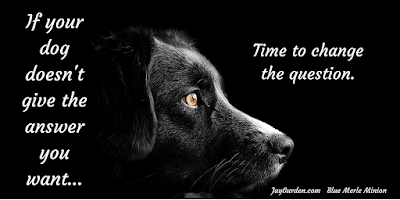There is a tendency among dog guardians to think of the behaviours we see in our dogs as being either ‘good’ or ‘bad’. There are the desirable behaviours, the things that we want our dogs to do, and the undesirable ones, those behaviours we may call misbehaving, being naughty, behaviour problems, and so on.
The thing is that these labels of behaviour are not really either accurate or useful.
When looking at the things our dogs do, what we need to be asking ourselves is ‘What is my dog trying to tell me?’
Dogs communicate through the use of body language and behaviour. This can be tricky for a predominantly verbal species like humans to understand, but it is an important part of being the best guardians and caregivers for our dogs that we can. And this begins with understanding that behaviour is communication.
 |
| For instance, this says 'I'm so relaxed right now...' |
• The need for a suitable environment.
• The need for a suitable diet.
• The need to be able to exhibit normal behaviour patterns.
• The need to be housed with, or apart, from other animals.
• The need to be protected from pain, suffering, injury, and disease.
It is important to note that some people talk about these as the ‘gold standard’ of welfare when, in fact, these are really the minimum that we are responsible for ensuring the animals in our care experience.
If these needs are met, our dogs will be happy, contented, and relaxed, and this will show in their body language. Loose and wiggly movements, soft facial expressions, and a general appearance of being relaxed throughout the face and body. Dogs who are willing and wanting to play are happy dogs, as stressed dogs are usually unable to engage in play.
The result of these needs not being met is stress, and this is when the ‘problem’ behaviours can start to show.
For this reason, we need to start thinking about what the dog is trying to communicate by the behaviours they are showing.
Blowing off recall? The environment may be too distracting, the dog not able to concentrate and respond to the cue as they normally would, or something in the environment could be causing them to be scared or hypervigilant and that is taking up all their attention. Of course, it could also mean that the recall needs more work in quieter environments, so it’s important to consider the potential issues here.
Barking? The dog may be able to hear something worrying them. They might be anticipating that they are about to be left alone and they suffer from separation related problems. They may need something, and this is a way that they have discovered gets attention and so more likely they will be able to get what they need. Or as was the case often with one of my past dogs their toy may have gone under a piece of furniture, and they are soliciting help to retrieve it!
Destructive chewing/digging? This could again be linked to separation related problems and is the dog’s response to the anxiety and distress they feel at being left alone. It could be the result of boredom, of the dog receiving insufficient stimulation and so going looking for things to do. It could be a teething puppy chewing to relieve their sore gums.
It’s time to stop putting labels on behaviours like ‘good’ or ‘bad’ and to start thinking about what they mean, what the dog is telling us by these behaviours. Once we can look at the behaviour in terms of communication, then we can grow closer in understanding with our dogs and making sure we are fully meeting their needs.
* * * * *
In other news, through my Good Guardianship site I am now offering a new on demand webinar - Supporting a Reactive Dog. In this webinar I describe my five pillar approach to supporting a complex and sensitive dog who struggles with aspects of their environment and how to help them to feel safer and more comfortable.

No comments:
Post a Comment